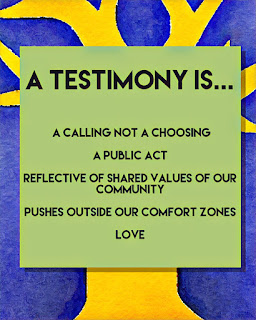As I have researched Quaker Testimonies, the idea of personal or classroom testimonies has intrigued me. I was particularly struck by Paul Buckley's writings on the idea of the history of testimonies and the qualities that testimonies posses.
I have distilled Paul's thinking into 5 succinct ideas which are more accessible as a teaching tool for children.
We use these as guidelines to teach our students how to discover their own personal testimony.
Paul wrote:
"I believe there are five essential characteristics that distinguish a testimony:
First and foremost - as early Friends, Howard Brinton, and Wilmer Cooper all agree - a testimony is something we are called or led to - not something we choose to do on our own. It arises from a relationship with God. You could say it comes from “that of God” within us, not “that of us.” Contemporary Friends use a variety of terms to name this: Spirit, the Inward Light, Christ, the One, Goddess, 241.0496 B9247O 2012 The Origin of the SPICES–Paul Buckley http://www.scym.org/docs/2012keynote_paulbuckley.pdf 10 of 15 the unfolding of creation, and others. The particular words don’t matter. What is essential is that the source - the origin - is not our reason or our tradition or our personal preferences. So, for example, if I engage in peace work because it makes me look good to people I admire, it isn’t a testimony. It may well be good work, valuable work, important work, but it isn’t a testimony.
Second, you must testify to a testimony. In other words, it has to be public behavior. Something I do within my family or among close friends is not a testimony. It may be a tradition or a habit, but it isn’t a testimony. For example, if I refer to Sunday as First Day when I’m among Quakers, but call it Sunday I’m when talking to others, isn’t a testimony. It’s just a quaint custom.
Third, if we are to refer to something as a Quaker testimony, it should be representative of our entire community. I have a personal calling - to write about Quaker history and theology. I believe it is divinely inspired and it is certainly public behavior. It is a testimony, but it is my personal testimony, not a Quaker testimony. I believe it’s good and valuable work, but I need to distinguish it from the work we are called to do as a community.
Fourth, a testimony is what early Friends called “a cross to the conscience.” This comes in two flavors; it’s a challenge to my own conscience - you might say it calls on me to act outside my comfort zone - and, equally important, it’s a challenge to the consciences of others."
"Finally, a testimony flows from, and is an expression of, love - God’s love and our love."
Paul Buckley, The Origin of the SPICES





No comments:
Post a Comment